人教新目标(Go for it)版 九年级全Unit1How can we become good learners? Sectoin A 2a-2d课件(共38张PPT)
文档属性
| 名称 | 人教新目标(Go for it)版 九年级全Unit1How can we become good learners? Sectoin A 2a-2d课件(共38张PPT) | 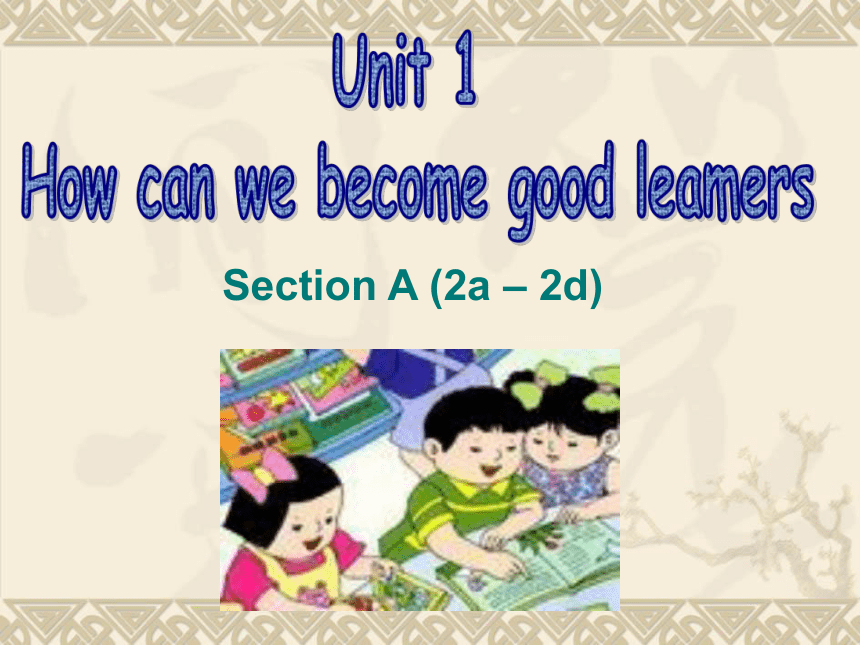 | |
| 格式 | ppt | ||
| 文件大小 | 1.6MB | ||
| 资源类型 | 教案 | ||
| 版本资源 | 人教新目标(Go for it)版 | ||
| 科目 | 英语 | ||
| 更新时间 | 2022-06-29 11:18:09 | ||
图片预览

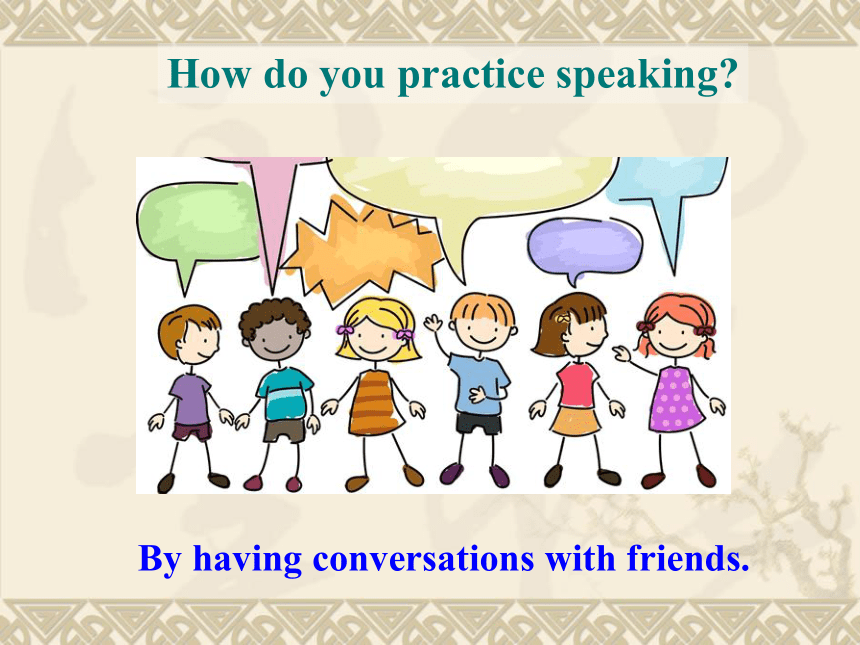
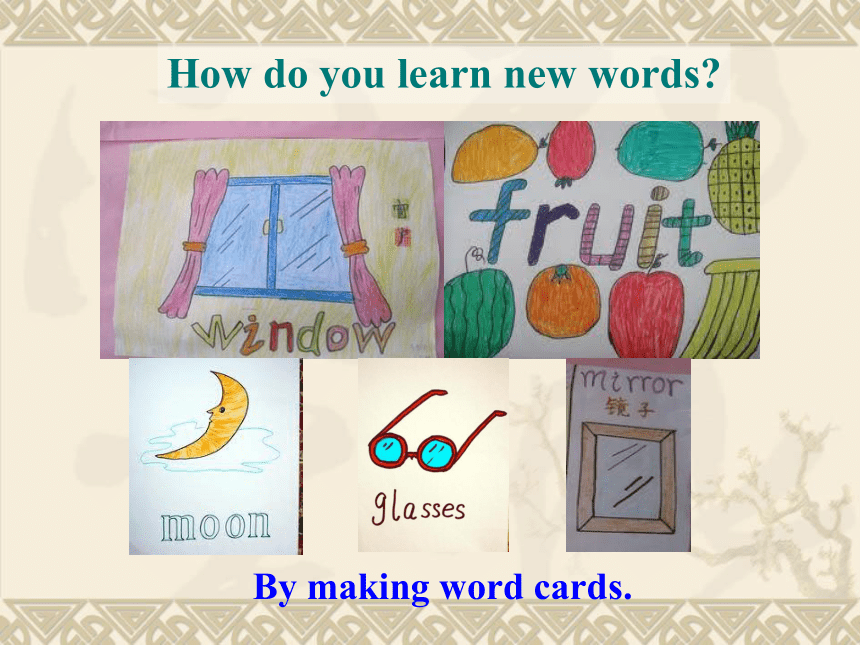

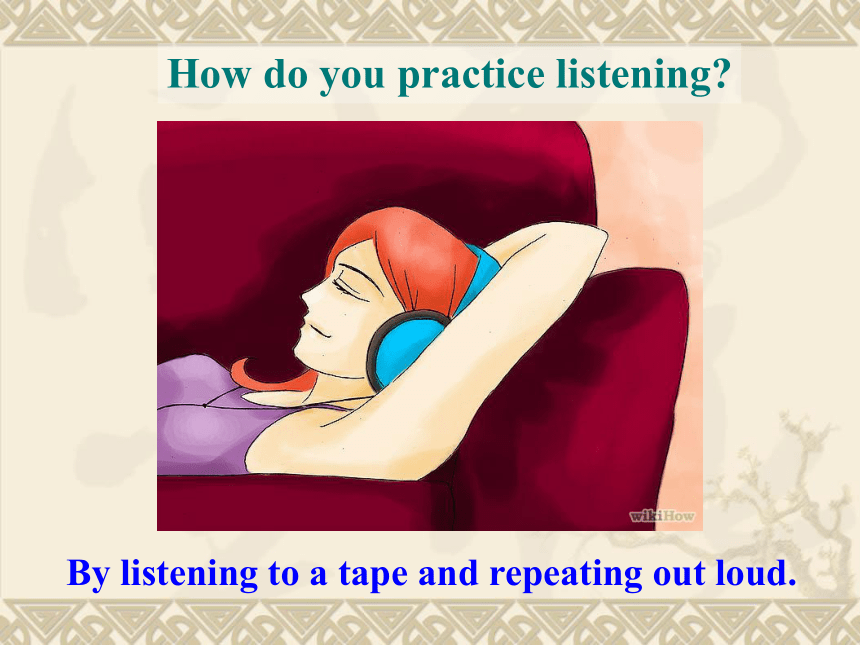
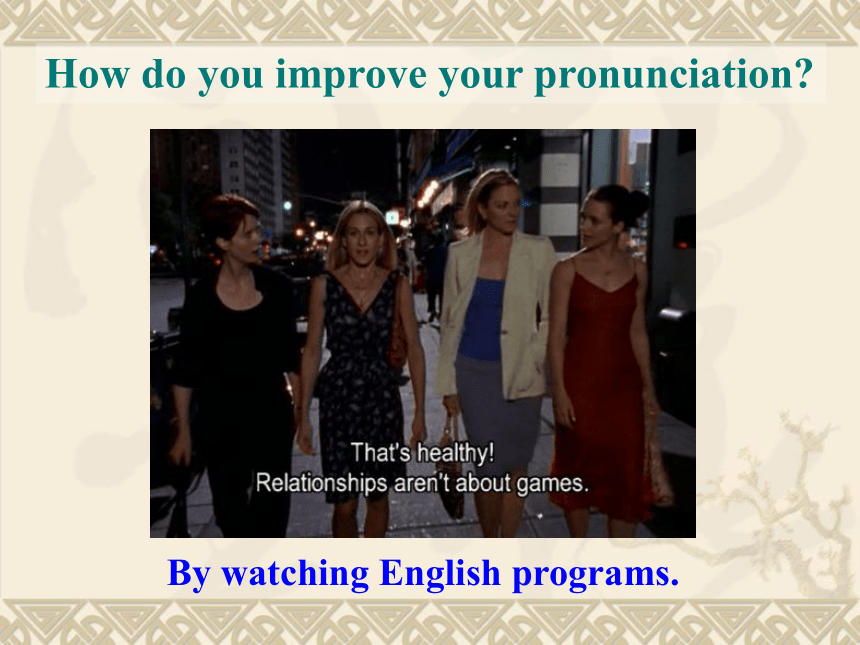
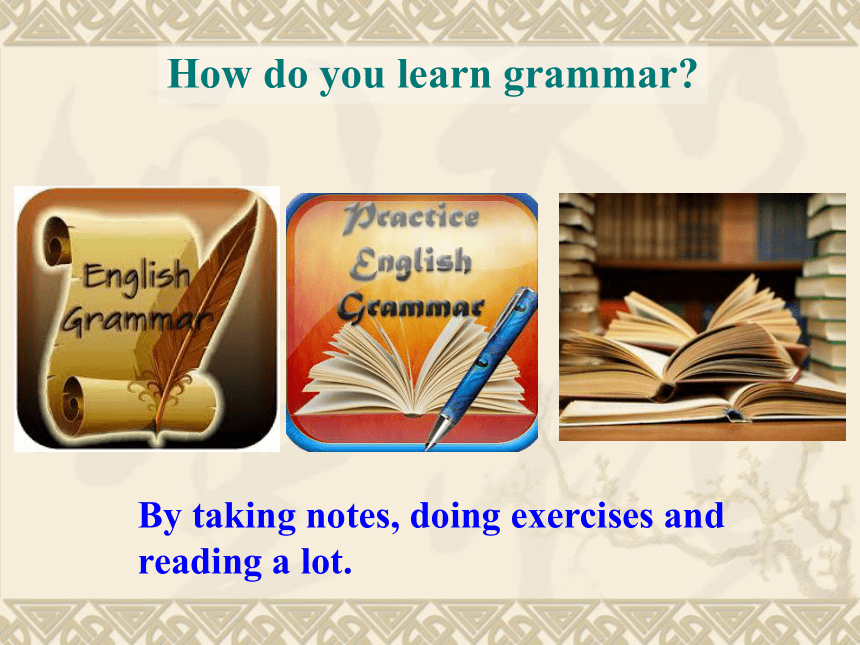
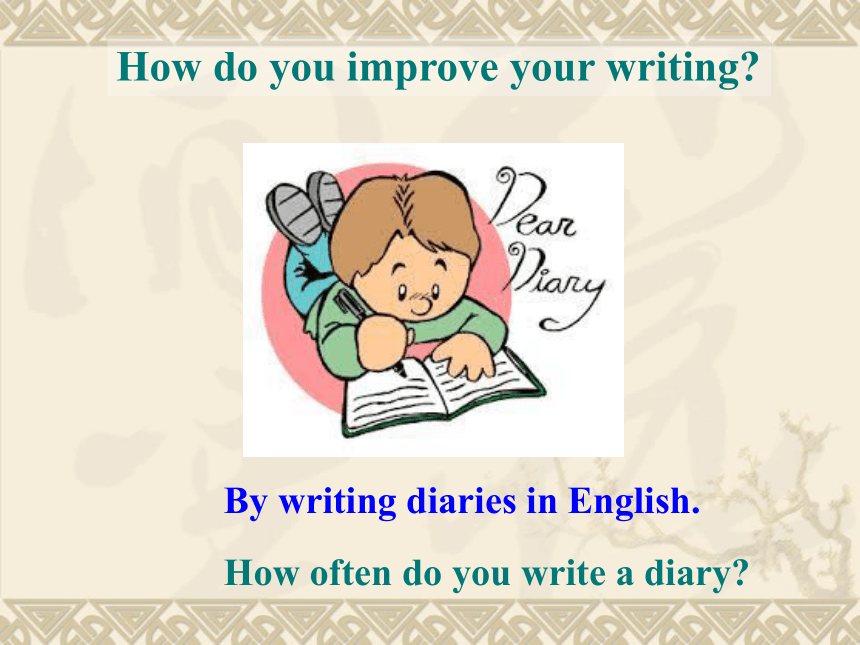
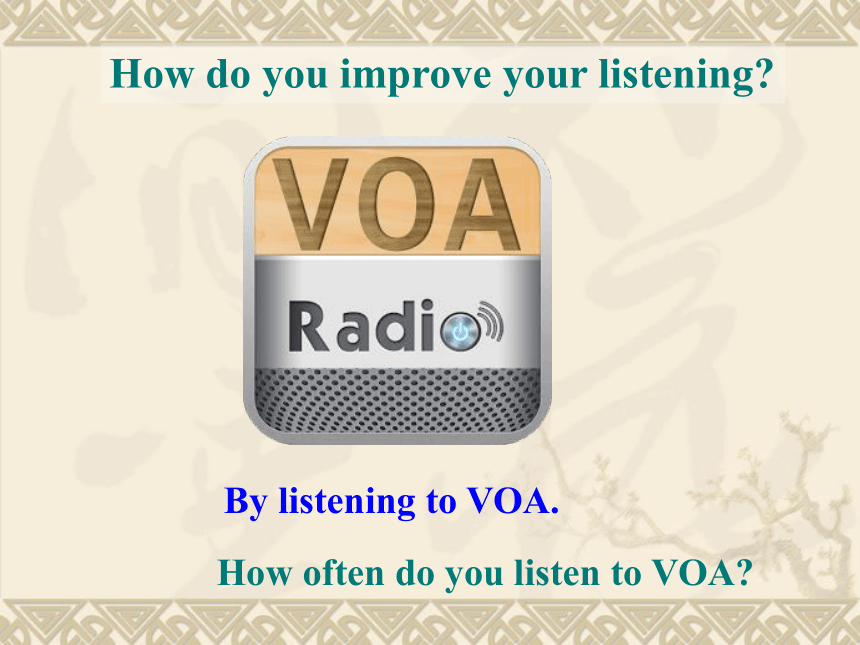
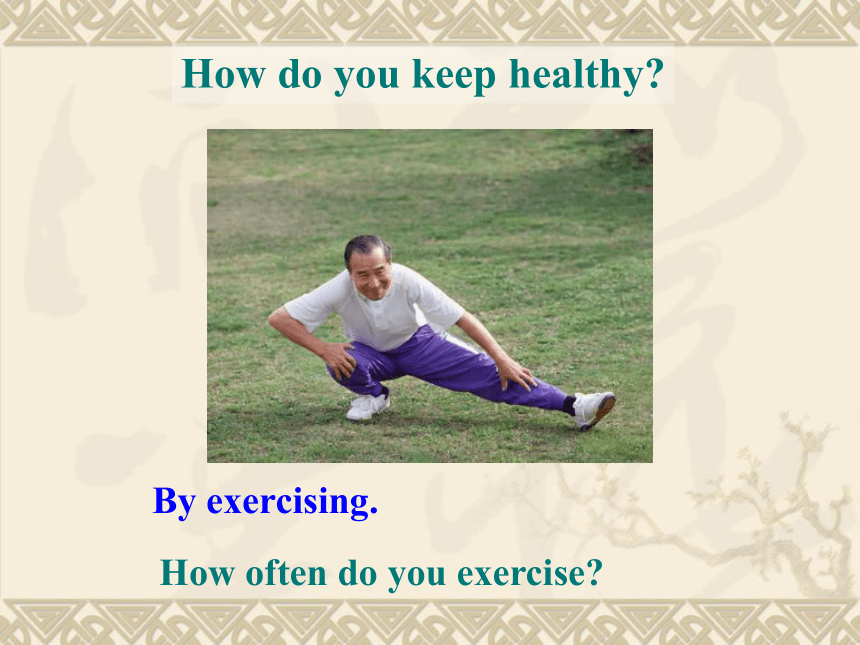
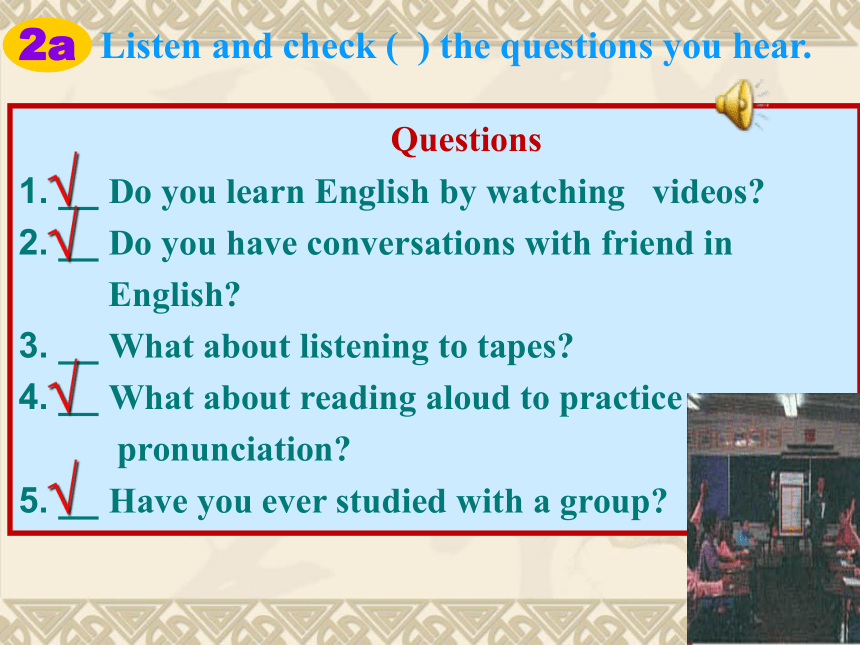
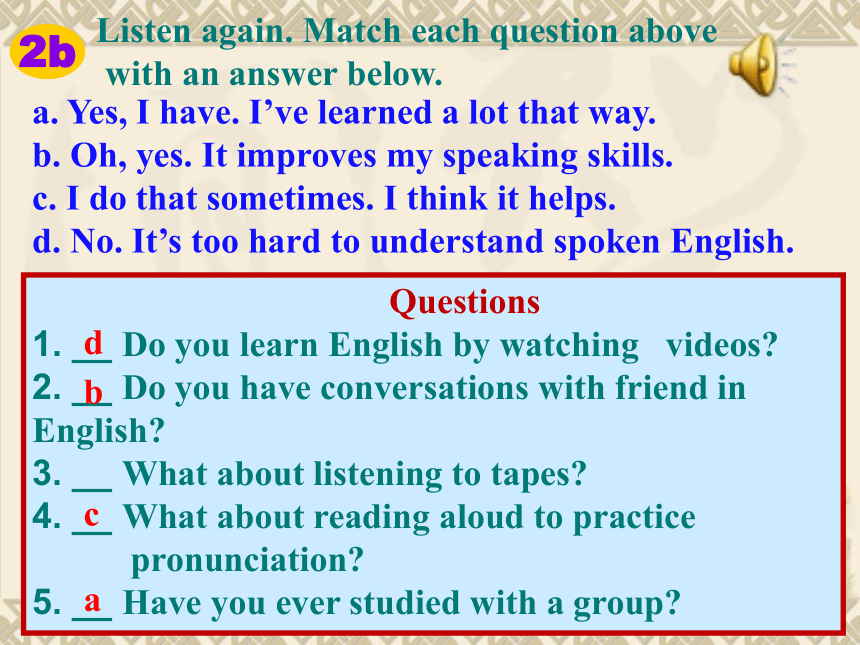
文档简介
(共38张PPT)
Section A (2a – 2d)
How do you practice speaking
By having conversations with friends.
How do you learn new words
By making word cards.
How do you improve your writing
By writing e-mails to my pen pals.
How do you practice listening
By listening to a tape and repeating out loud.
How do you improve your pronunciation
By watching English programs.
How do you learn grammar
By taking notes, doing exercises and reading a lot.
How do you improve your writing
By writing diaries in English.
How often do you write a diary
How do you improve your listening
By listening to VOA.
How often do you listen to VOA
How do you keep healthy
By exercising.
How often do you exercise
Questions
1. __ Do you learn English by watching videos
2. __ Do you have conversations with friend in
English
3. __ What about listening to tapes
4. __ What about reading aloud to practice
pronunciation
5. __ Have you ever studied with a group
Listen and check ( ) the questions you hear.
2a
√
√
√
√
Listen again. Match each question above
with an answer below.
Questions
1. __ Do you learn English by watching videos
2. __ Do you have conversations with friend in English
3. __ What about listening to tapes
4. __ What about reading aloud to practice
pronunciation
5. __ Have you ever studied with a group
d
b
c
a
2b
a. Yes, I have. I’ve learned a lot that way.
b. Oh, yes. It improves my speaking skills.
c. I do that sometimes. I think it helps.
d. No. It’s too hard to understand spoken English.
Summaries
have conversations with
read aloud
study with a group
speaking skills
spoken English
2c
Make conversations using the information in 2a and 2b.
A: Have you ever studied with a group
B: Yes, I have. I’ve learned a lot that way.
Survey
Ask your partners how he or she studies for a test and then do a report.
Name How to study for a test
Report: XX studies for a test by …
2d
Role-play conversation.
Jack: Annie, I’m a little nervous. I have to finish
reading a book and give a report next
Monday.
Annie: That doesn’t sound too bad.
Jack: But I’m a very slow reader.
Annie: For the first time, just read quickly to
get the main ideas. Don’t read word by
word, read word groups.
Jack: But I don’t understand many of the
words. I have to use a dictionary.
Annie: Try to guess a word’s meaning by
reading the sentences before and after
it. You probably understand more than
you think.
Jack: That sounds difficult!
Annie: Well, be patient. It takes time. You can
become better by reading something
you enjoy every day. The more you read,
the faster you’ll be.
Summaries
finish doing
For the first time
read word by word
read word groups.
guess a word’s meaning
be patient
It takes time
The more you read, the faster you’ll be.
现在完成时 (Present Perfect)
现在完成时表示过去发生的某一动作对现在造成的影响或产生的结果;或这一动作开始于过去,持续到现在,并将继续下去。
构成:1. 肯定句
现在完成时的肯定句式是
“have (has)+过去分词”。
注意:该句式中的have或has是助动词,has用于第三人称单数,其它人称一律用have。
2. 否定句:现在完成时的否定句式是
“haven’t(hasn’t)+过去分词”。
3. 疑问句:现在完成时的一般疑问句式
是把助动词have或has提到主语之前。
回答用Yes, …have (has). /No, …haven’t (hasn’t).
连用时间状语:already, yet, ever, never, just, before, several times 等。
注意:当have被用在现在完成时态中时,它可以和前面的代名词一起组成缩写形式。
我曾经到过纽约。
I’ve been to New York once before.
我刚丢了我的铅笔盒。
I’ve just lost my pencil-box.
注意:never, ever一般置于助动词have/has之后,过去分词之前。
1. never 从来没有,从不,表示否定
He has never seen such a tall building.
他从未见过这么高的楼。
2. ever 曾经,主要用于疑问句
Have you ever wanted to travel around the world
你曾经想要周游世界吗?
have been to与have gone to 的区别
1. have (has) been to意为“曾经去过某地”,表示现在已经不在那里了。可与just, ever, never等连用。如:
I’ve just been to the post office.
我刚才去邮局了。
Have you ever been to Hangzhou
你曾经去过杭州吗?
Mary has never been to the Great Wall.
玛丽从未去过长城。
have (has) been to 后面可接次数,表示去过某地几次。
I’ve been to Beijing three times.
我去过北京三次。
They have been to that village several times.
他们去过那个村庄好几次了。
2. have (has) gone to 意为“到某地去了”,表示到了某地或正在去某地的途中。总之,说话时该人不在现场,一般不用第一、第二人称代词作句子的主语。如:
Where is Tom 汤姆在哪里?
- He has gone to the bookshop.他到书店去。
同学们要注意现在完成时与一般过去时的区别。虽然这两个时态都和过去发生的事情有关,但是现在完成时强调这一动作与现在的关系,如对现在产生的结果、影响等,而一般过去时只表示过去的事实,不表示和现在的关系。如:
I have just been to London. I went there last month.
我刚去过伦敦,是上个月去的。
I have been to the science museum many times. I went there on our last summer vocation.
我已经去了科学博物馆很多次。 上个暑假我还去了呢。
1. A: Do you want _______ (come) to the space museum
B: No, I’ve already _____ (be) there three times.
2. A: Have you ____ (see) the robots at the science museum
B: Yes, I _____ (go) there last weekend.
Put the correct forms of the verbs in the blanks. (4a)
to come
been
seen
went
选择填空 1. The Oriental Pearl TV Tower ______ tens of thousands of visitors since 1995. A. attracted B. attracts
C. has attracted D. will attract 2. They _______ since the factory opened. A. has worked here B. have worked here C. worked here D. are working
3. Since 2000 Nanchang has become a new
city. Everything ________. A. is changed B. was changed
C. has changed D. had changed
C
B
C
4. The house is dirty. We _______ it for weeks.
A. didn’t clean B. hadn’t cleaned
C. don’t clean D. haven’t cleaned
5. Harry Potter is a very nice film. I _____ it twice.
A. will see B. have seen
C. saw D. see
D
B
翻译 1. 我叔叔离开上海10天了,他是上星期离开的。
2. 你们太迟了,电影已经开始五分钟了。
3. --- 你到这里多久了?--- 两天。
My uncle has been away from Shanghai for
ten days. He left last week.
You are too late. The movie has been on for five minutes.
--- How long have you been here
--- Two days.
Mr. White came to our school in 2008, and since then he ________ us English.
A. teaches B. taught
C. has taught D. will teach
答案:C
【解析】考查动词时态。从since then知应该用现在完成时态。
Do you know ________ she went to the movie last night
— On foot.
A. when B. why C. how
答案:C
【解析】疑问副词的用法。从答句On foot可以看出问句是有关交通方式的,when表示“什么时间”;why表示“为什么”,how表示“怎么”,对交通方式提问一般用how,因此本题选C。
– How do you study for a test
-- _____ working with friends.
A. By B. With C. On
答案: A
【解析】本题考查介词by的用法。by意为“通过……方式”;with意为“和……在一起”;on意为“朝,向”.句意“你是怎么为考试作准备吗?”“通过和朋友一起学习。”只有by具有“通过……方式”的意思,故选A。
I. 根据括号内的要求完成下列各句,每 空一词(含缩写)。
1. My parents have come back already. (改为否定句)
My parents _______ ______ back ____.
2. The boys have been to Japan lots of times. (改为一般疑问句)
_______ the boys _______ to Japan lots of times
Have been
haven’t come
yet
3. Has your sister gone to the bookstore (作肯定回答)
_______, she _______.
4. I have been to the theme park three times. (对划线部分提问)
_____ ______ times have you been to the theme park
5. The movie has been on for half an hour. (对划线部分提问)
_____ _______ has the movie been on
How many
Yes has
How long
Ⅱ. 根据括号中所给动词的提示完成下列句子或对话。
1. I ____________________ (work) in this city for 7 years.
2. — How long ______ she ______ (live) here
— Since she ______ (get) a new job here.
3. How many words _____ you _______ (learn) since two years ago
4. My mother ____ never ________ (hear) of this man.
5. Tom _________(be) to China twice.
has lived
have worked / worked
got
have
learned / learnt
has
heard
has been
Learn the new words and expressions by heart.
Section A (2a – 2d)
How do you practice speaking
By having conversations with friends.
How do you learn new words
By making word cards.
How do you improve your writing
By writing e-mails to my pen pals.
How do you practice listening
By listening to a tape and repeating out loud.
How do you improve your pronunciation
By watching English programs.
How do you learn grammar
By taking notes, doing exercises and reading a lot.
How do you improve your writing
By writing diaries in English.
How often do you write a diary
How do you improve your listening
By listening to VOA.
How often do you listen to VOA
How do you keep healthy
By exercising.
How often do you exercise
Questions
1. __ Do you learn English by watching videos
2. __ Do you have conversations with friend in
English
3. __ What about listening to tapes
4. __ What about reading aloud to practice
pronunciation
5. __ Have you ever studied with a group
Listen and check ( ) the questions you hear.
2a
√
√
√
√
Listen again. Match each question above
with an answer below.
Questions
1. __ Do you learn English by watching videos
2. __ Do you have conversations with friend in English
3. __ What about listening to tapes
4. __ What about reading aloud to practice
pronunciation
5. __ Have you ever studied with a group
d
b
c
a
2b
a. Yes, I have. I’ve learned a lot that way.
b. Oh, yes. It improves my speaking skills.
c. I do that sometimes. I think it helps.
d. No. It’s too hard to understand spoken English.
Summaries
have conversations with
read aloud
study with a group
speaking skills
spoken English
2c
Make conversations using the information in 2a and 2b.
A: Have you ever studied with a group
B: Yes, I have. I’ve learned a lot that way.
Survey
Ask your partners how he or she studies for a test and then do a report.
Name How to study for a test
Report: XX studies for a test by …
2d
Role-play conversation.
Jack: Annie, I’m a little nervous. I have to finish
reading a book and give a report next
Monday.
Annie: That doesn’t sound too bad.
Jack: But I’m a very slow reader.
Annie: For the first time, just read quickly to
get the main ideas. Don’t read word by
word, read word groups.
Jack: But I don’t understand many of the
words. I have to use a dictionary.
Annie: Try to guess a word’s meaning by
reading the sentences before and after
it. You probably understand more than
you think.
Jack: That sounds difficult!
Annie: Well, be patient. It takes time. You can
become better by reading something
you enjoy every day. The more you read,
the faster you’ll be.
Summaries
finish doing
For the first time
read word by word
read word groups.
guess a word’s meaning
be patient
It takes time
The more you read, the faster you’ll be.
现在完成时 (Present Perfect)
现在完成时表示过去发生的某一动作对现在造成的影响或产生的结果;或这一动作开始于过去,持续到现在,并将继续下去。
构成:1. 肯定句
现在完成时的肯定句式是
“have (has)+过去分词”。
注意:该句式中的have或has是助动词,has用于第三人称单数,其它人称一律用have。
2. 否定句:现在完成时的否定句式是
“haven’t(hasn’t)+过去分词”。
3. 疑问句:现在完成时的一般疑问句式
是把助动词have或has提到主语之前。
回答用Yes, …have (has). /No, …haven’t (hasn’t).
连用时间状语:already, yet, ever, never, just, before, several times 等。
注意:当have被用在现在完成时态中时,它可以和前面的代名词一起组成缩写形式。
我曾经到过纽约。
I’ve been to New York once before.
我刚丢了我的铅笔盒。
I’ve just lost my pencil-box.
注意:never, ever一般置于助动词have/has之后,过去分词之前。
1. never 从来没有,从不,表示否定
He has never seen such a tall building.
他从未见过这么高的楼。
2. ever 曾经,主要用于疑问句
Have you ever wanted to travel around the world
你曾经想要周游世界吗?
have been to与have gone to 的区别
1. have (has) been to意为“曾经去过某地”,表示现在已经不在那里了。可与just, ever, never等连用。如:
I’ve just been to the post office.
我刚才去邮局了。
Have you ever been to Hangzhou
你曾经去过杭州吗?
Mary has never been to the Great Wall.
玛丽从未去过长城。
have (has) been to 后面可接次数,表示去过某地几次。
I’ve been to Beijing three times.
我去过北京三次。
They have been to that village several times.
他们去过那个村庄好几次了。
2. have (has) gone to 意为“到某地去了”,表示到了某地或正在去某地的途中。总之,说话时该人不在现场,一般不用第一、第二人称代词作句子的主语。如:
Where is Tom 汤姆在哪里?
- He has gone to the bookshop.他到书店去。
同学们要注意现在完成时与一般过去时的区别。虽然这两个时态都和过去发生的事情有关,但是现在完成时强调这一动作与现在的关系,如对现在产生的结果、影响等,而一般过去时只表示过去的事实,不表示和现在的关系。如:
I have just been to London. I went there last month.
我刚去过伦敦,是上个月去的。
I have been to the science museum many times. I went there on our last summer vocation.
我已经去了科学博物馆很多次。 上个暑假我还去了呢。
1. A: Do you want _______ (come) to the space museum
B: No, I’ve already _____ (be) there three times.
2. A: Have you ____ (see) the robots at the science museum
B: Yes, I _____ (go) there last weekend.
Put the correct forms of the verbs in the blanks. (4a)
to come
been
seen
went
选择填空 1. The Oriental Pearl TV Tower ______ tens of thousands of visitors since 1995. A. attracted B. attracts
C. has attracted D. will attract 2. They _______ since the factory opened. A. has worked here B. have worked here C. worked here D. are working
3. Since 2000 Nanchang has become a new
city. Everything ________. A. is changed B. was changed
C. has changed D. had changed
C
B
C
4. The house is dirty. We _______ it for weeks.
A. didn’t clean B. hadn’t cleaned
C. don’t clean D. haven’t cleaned
5. Harry Potter is a very nice film. I _____ it twice.
A. will see B. have seen
C. saw D. see
D
B
翻译 1. 我叔叔离开上海10天了,他是上星期离开的。
2. 你们太迟了,电影已经开始五分钟了。
3. --- 你到这里多久了?--- 两天。
My uncle has been away from Shanghai for
ten days. He left last week.
You are too late. The movie has been on for five minutes.
--- How long have you been here
--- Two days.
Mr. White came to our school in 2008, and since then he ________ us English.
A. teaches B. taught
C. has taught D. will teach
答案:C
【解析】考查动词时态。从since then知应该用现在完成时态。
Do you know ________ she went to the movie last night
— On foot.
A. when B. why C. how
答案:C
【解析】疑问副词的用法。从答句On foot可以看出问句是有关交通方式的,when表示“什么时间”;why表示“为什么”,how表示“怎么”,对交通方式提问一般用how,因此本题选C。
– How do you study for a test
-- _____ working with friends.
A. By B. With C. On
答案: A
【解析】本题考查介词by的用法。by意为“通过……方式”;with意为“和……在一起”;on意为“朝,向”.句意“你是怎么为考试作准备吗?”“通过和朋友一起学习。”只有by具有“通过……方式”的意思,故选A。
I. 根据括号内的要求完成下列各句,每 空一词(含缩写)。
1. My parents have come back already. (改为否定句)
My parents _______ ______ back ____.
2. The boys have been to Japan lots of times. (改为一般疑问句)
_______ the boys _______ to Japan lots of times
Have been
haven’t come
yet
3. Has your sister gone to the bookstore (作肯定回答)
_______, she _______.
4. I have been to the theme park three times. (对划线部分提问)
_____ ______ times have you been to the theme park
5. The movie has been on for half an hour. (对划线部分提问)
_____ _______ has the movie been on
How many
Yes has
How long
Ⅱ. 根据括号中所给动词的提示完成下列句子或对话。
1. I ____________________ (work) in this city for 7 years.
2. — How long ______ she ______ (live) here
— Since she ______ (get) a new job here.
3. How many words _____ you _______ (learn) since two years ago
4. My mother ____ never ________ (hear) of this man.
5. Tom _________(be) to China twice.
has lived
have worked / worked
got
have
learned / learnt
has
heard
has been
Learn the new words and expressions by heart.
同课章节目录
- Unit 1 How can we become good learners.
- Section A
- Section B
- Unit 2 I think that mooncakes are delicious!
- Section A
- Section B
- Unit 3 Could you please tell me where the restroom
- Section A
- Section B
- Unit 4 I used to be afraid of the dark.
- Section A
- Section B
- Unit 5 What are the shirts made of?
- Section A
- Section B
- Review of Units 1-5
- Unit 6 When was it invented?
- Section A
- Section B
- Unit 7 Teenagers should be allowed to choose their
- Section A
- Section B
- Unit 8 It must belong to Carla.
- Section A
- Section B
- Unit 9 I like music that I can dance to.
- Section A
- Section B
- Unit 10 You're supposed to shake hands.
- Section A
- Section B
- Review of Units 6-10
- Unit 11 Sad movies make me cry.
- Section A
- Section B
- Unit 12 Life is full of the unexpected
- Section A
- Section B
- Unit 13 We're trying to save the earth!
- Section A
- Section B
- Unit 14 I remember meeting all of you in Grade 7.
- Section A
- Section B
- Review of Units 11-14
